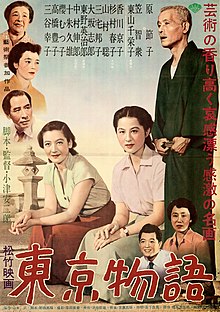An elderly couple travel from Onomichi to visit three of their five children in Tokyo. Their youngest, Kyoko, lives with them in Onomichi, and their middle child, Shoji, went missing during World War II.
Sounds simple right? Well, it is … and it is anything but.
Title: Tokyo Monogatari aka Tokyo Story
Country: Japan
Director: Yasujiro Ozu
Writer(s): Yasujiro Ozu, Kogo Noda
Release: November 3 1953
Cast: Setsuko Hara, Chishu Ryu, Chieko Higashiyama, Kyoko Kagawa, Haruko Sugimura, So Yamamura, Kuniko Miyake, Eijiro Tono, Nobuo Nakamura, Mutsuko Sakura,
See also: Tokyo Story Reviews ~ Tokyo Story in Top Movie Lists ~ Tokyo Story Merchandise
One of the joys of Asian cinema is the different approaches to the theme of comparing changes in the individual or family dynamic alongside changes in the culture of a country.
It’s relatively common with directors like Hirokazu Koreeda from Japan, Jiang Wen in China and Hou Hsiao-Hsien in Taiwan but Ozu, whilst perhaps not being the first, is definitely the master and his influence can be seen in those other directors – particularly in countryman Koreeda.
This is Ozu’s most famous film – and many say his best although I don’t completely agree with that. What is definitely true though is that it’s a masterclass in visual storytelling. Every shot is perfect and contributes to the story – as is every line and every show of emotion from the characters.
This leads me, of course, to Setsuko Hara. The greatest actress of all time and somewhat of an enigma given that she retired from acting just 10 years after this film (and just after Ozu died of cancer) and then seldom appeard in public again. She lived another 52 years in her home near her family.
She simply said she never really liked acting …
The relationship between her and Ozu creates something mesmerising on screen. She has a smile that could light up a screen like no other and whilst the smile never leaves her, minute changes convey completely different emotions. The uncomfortable discussion in Late Spring where she smiles passive agressively whilst basically telling her uncle he disgusts her is a case in point.
Interestingly, as much as I love her in every Ozu film she was in, it was actually in a Kurosawa film where she was perhaps at her best. Nowhere near Kurosawa’s best film but in The Idiot, Hara avoided the sterotype and played an at times unpleasant character. Still smiling though and she is the main reason to watch that film.
Tokyo Story also includes many of Ozu’s other favourite actors such as Chishu Ryu, Haruko Sugimura and Chieko Higashiyama. It also has the brilliant Kyoko Kagawa in a relatively early role. I could be wrong but I think this may have been her only Ozu film.
Overall Tokyo Story brilliantly illuminates the generation gap, visible in many families, that gets exacerbated by a country changing rapidly around them. The themes are as relevant today as they were in 1953 and overall Ozu created a film that deserves to be called one of the best ever.
Rating: 91/100

